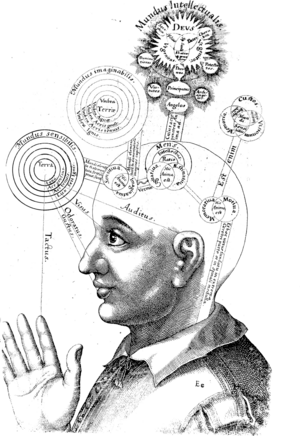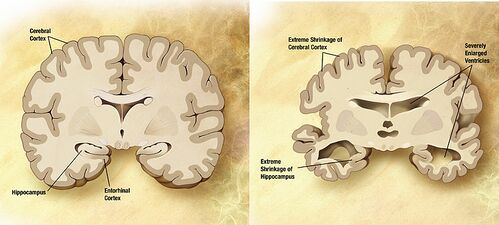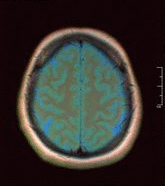Cognitive Impairments: Difference between revisions
Kim Jackson (talk | contribs) m (Kim Jackson moved page Cognitive Deficits to Cognitive Impairments: More appropriate title) |
No edit summary |
||
| Line 2: | Line 2: | ||
'''Original Editor '''- [[User:Lucinda hampton|Lucinda hampton]] | '''Original Editor '''- [[User:Lucinda hampton|Lucinda hampton]] | ||
'''Top Contributors''' - {{Special:Contributors/{{FULLPAGENAME}}}} | '''Top Contributors''' - {{Special:Contributors/{{FULLPAGENAME}}}} | ||
</div> | </div> | ||
== Introduction == | == Introduction == | ||
[[File:Cognition.png|right|frameless]] | [[File:Cognition.png|right|frameless]] | ||
Cognitive | Cognitive Impairment is not an illness but a description of someone's condition. It means they have trouble with things like memory or paying attention. They might have trouble speaking or understanding. And they might have difficulty recognising people, places or things, and might find new places or situations overwhelming<ref name=":0">health direct [https://www.healthdirect.gov.au/cognitive-impairment Cognitive impairment] Available: https://www.healthdirect.gov.au/cognitive-impairment<nowiki/>(accessed 25.6.2021)</ref>. | ||
Cognition is the mental action or process of acquiring knowledge and understanding through thought, experience, and the [[Sensation|senses]]. It encompasses various aspects of high-level intellectual functions and processes such as e.g. attention, [[memory]], knowledge, [[Decision Making Aids|decision]] making, planning, reasoning, judgment, perception, comprehension, language, and [[Unilateral Neglect|visuospatial]] function. | Cognition is the mental action or process of acquiring knowledge and understanding through thought, experience, and the [[Sensation|senses]]. It encompasses various aspects of high-level intellectual functions and processes such as e.g. attention, [[memory]], knowledge, [[Decision Making Aids|decision]] making, planning, reasoning, judgment, perception, comprehension, language, and [[Unilateral Neglect|visuospatial]] function. | ||
| Line 19: | Line 19: | ||
== Etiology == | == Etiology == | ||
[[File:Alzheimer's disease brain comparison.jpg|499x499px|alt=|thumb|Alzheimer's brain comparison]] | [[File:Alzheimer's disease brain comparison.jpg|499x499px|alt=|thumb|Alzheimer's brain comparison]] | ||
Cognitive deficits may be from birth or caused later by environmental factors such | Cognitive deficits may be from birth or caused later by environmental factors such as [[Brain Anatomy|brain]] injury, mental illness, and neurological disorders. Not every elderly will have a cognitive deficit, but the cognitive deficit is more common in the elderly. | ||
Some causes of short-term or reversible cognitive impairment include: | Some causes of short-term or reversible cognitive impairment include: | ||
* Infections | * Infections e.g. [[Urinary Tract Infection|urinary tract infection]] or [[pneumonia]] | ||
* [[Vitamin B12 Deficiency|Vitamin deficiency]] | * [[Vitamin B12 Deficiency|Vitamin deficiency]] | ||
* [[Dehydration]] | * [[Dehydration]] | ||
| Line 32: | Line 32: | ||
*[[Stroke]], delirium, [[dementia]], [[Depression|depressio]]<nowiki/>n, [[schizophrenia]], [[Alcoholism|chronic alcohol use]], substance abuse, [[Brain Metastasis|brain metastasis]] | *[[Stroke]], delirium, [[dementia]], [[Depression|depressio]]<nowiki/>n, [[schizophrenia]], [[Alcoholism|chronic alcohol use]], substance abuse, [[Brain Metastasis|brain metastasis]] | ||
*[[Traumatic Brain Injury|Head injury]] and [[Communicable Diseases|infection]] of the [[Brain Anatomy|brain]] or [[Meningitis|meninges]]. | *[[Traumatic Brain Injury|Head injury]] and [[Communicable Diseases|infection]] of the [[Brain Anatomy|brain]] or [[Meningitis|meninges]]. | ||
* Brain pathologies like [[Alzheimer's Disease|Alzheimer disease]] (AD), [[Parkinson's|Parkinson disease]], [[Lewy Body Disease|Lewy body dementia]], [[Huntington Disease|Huntington's disease]], [[Human Immunodeficiency Virus (HIV)|HIV]] dementia, [[Prion Diseases (or Transmissible Spongiform Encephalopathies)|prion disease.]] | * [[Brain Anatomy|Brain]] pathologies like [[Alzheimer's Disease|Alzheimer disease]] (AD), [[Parkinson's|Parkinson disease]], [[Lewy Body Disease|Lewy body dementia]], [[Huntington Disease|Huntington's disease]], [[Human Immunodeficiency Virus (HIV)|HIV]] dementia, [[Prion Diseases (or Transmissible Spongiform Encephalopathies)|prion disease.]] | ||
* In childhood or adolescence, Cognitive deficit may develop as a result of many conditions. Some examples include side effects of [[Radiation Side Effects and Syndromes|cancer therapy]], [[Heavy Metal Poisoning|heavy metal poisoning,]] malnutrition, metabolic conditions, autism.<ref name=":1" /> | * In childhood or adolescence, Cognitive deficit may develop as a result of many conditions. Some examples include side effects of [[Radiation Side Effects and Syndromes|cancer therapy]], [[Heavy Metal Poisoning|heavy metal poisoning,]] [[malnutrition]], metabolic conditions, [[Autism Spectrum Disorder|autism]].<ref name=":1" /> | ||
Image 2: On R brain changes with advanced AD | Image 2: On R brain changes with advanced AD | ||
| Line 41: | Line 41: | ||
The frequency of cognitive deficit due to various causes is difficult to predict and is not well established. Increasing age is the most important factor for cognitive impairment.<ref name=":1" /> | The frequency of cognitive deficit due to various causes is difficult to predict and is not well established. Increasing age is the most important factor for cognitive impairment.<ref name=":1" /> | ||
The number of people suffering from cognitive impairment or dementia has been constantly on the rise. '''Around 50 million people''' have dementia worldwide, with 10 million new cases every year<ref>Prince M, Wimo A, Guerchet M, Ali GC, Wu Yutzu, Prina M. World Alzheimer Report 2015. The global impact of dementia: an analysis of prevalence, incidence, cost and trends. London: Alzheimer’s Disease International; 2015 Available: https://www.alzint.org/resource/world-alzheimer-report-2015/ (accessed 25.6.2021)</ref>. | The number of people suffering from cognitive impairment or dementia has been constantly on the rise. '''Around 50 million people''' have [[dementia]] worldwide, with 10 million new cases every year<ref>Prince M, Wimo A, Guerchet M, Ali GC, Wu Yutzu, Prina M. World Alzheimer Report 2015. The global impact of dementia: an analysis of prevalence, incidence, cost and trends. London: Alzheimer’s Disease International; 2015 Available: https://www.alzint.org/resource/world-alzheimer-report-2015/ (accessed 25.6.2021)</ref>. | ||
=== Pathophysiology === | === Pathophysiology === | ||
[[File:Brain normal MRI.gif|alt=|thumb|Brain normal MRI]] | [[File:Brain normal MRI.gif|alt=|thumb|Brain normal MRI]] | ||
The general pathology of cognitive decline/deficits is damage to [[Introduction to Neuroanatomy|neuronal tissue.]] The damage to certain areas is responsible for specific deficits | The general pathology of cognitive decline/deficits is damage to [[Introduction to Neuroanatomy|neuronal tissue.]] The damage to certain areas is responsible for specific deficits like damage to the [[Parietal Lobe|parietal lobe]] can cause the inability to dress or visuospatial function; damage to the [[Frontal Lobe Brain Injury|frontal lobe]] systems can cause deficits in planning, and abstract understanding; damage to the [[Temporal Lobe|temporal lobes]] cause deficits in language and memory. | ||
The causes of this damage are due to toxicity to neurons from: | The causes of this damage are due to toxicity to neurons from: | ||
# Metabolic disorders; heavy metals or other toxins; infection; ischemic damage due to stroke or hemorrhage. | # Metabolic disorders; heavy metals or other toxins; infection; ischemic damage due to stroke or hemorrhage. | ||
# Direct injuries | # Direct injuries e.g. head injury, cancer or surgery. | ||
Damage can also be caused by neurodegenerative processes | Damage can also be caused by neurodegenerative processes e.g. Alzheimer, Parkinson, [[Multiple Sclerosis (MS)|multiple sclerosis]], or Huntington disease. These illnesses appear to directly damage neuronal tissue through immunologic interaction with abnormal proteins. | ||
== Presentation == | == Presentation == | ||
| Line 62: | Line 62: | ||
* Not recognizing familiar people and places. | * Not recognizing familiar people and places. | ||
* Having trouble exercising judgment, such as knowing what to do in an emergency. | * Having trouble exercising judgment, such as knowing what to do in an emergency. | ||
* Changes in mood or behavior | * Changes in mood or behavior. | ||
* Vision problems. | * Vision problems. | ||
* Difficulty planning and carrying out tasks eg following a recipe or keeping track of monthly bills. | * Difficulty planning and carrying out tasks eg following a recipe or keeping track of monthly bills. | ||
| Line 88: | Line 88: | ||
* There is no pharmacological treatment for mild cognitive impairment. The management is focused on promoting functional status. | * There is no pharmacological treatment for mild cognitive impairment. The management is focused on promoting functional status. | ||
* Physiotherapy including [[Therapeutic Exercise|Exercise]] and [[Physical Activity|Physical activity]], [[Sleep: Older People|sleep hygiene]] counselling, relaxation techniques may help. | * Physiotherapy including [[Therapeutic Exercise|Exercise]] and [[Physical Activity|Physical activity]], [[Sleep: Older People|sleep hygiene]], counselling, relaxation techniques may help. | ||
* Cognitive training. | * Cognitive training. | ||
* Mediterranean diet may help people with cognitive impairment. | * Mediterranean diet may help people with cognitive impairment. | ||
| Line 97: | Line 97: | ||
See [https://www.physio-pedia.com/Preventing_Dementia_and_Cognitive_Decline?utm_source=physiopedia&utm_medium=search&utm_campaign=ongoing_internal Preventing Dementia and Cognitive Decline] | See [https://www.physio-pedia.com/Preventing_Dementia_and_Cognitive_Decline?utm_source=physiopedia&utm_medium=search&utm_campaign=ongoing_internal Preventing Dementia and Cognitive Decline] | ||
== Resources == | |||
== Resources== | [https://www.ncbi.nlm.nih.gov/pmc/articles/PMC6519596/ Clinical Approach to Cognitive Impairment] | ||
[https://www.ncbi.nlm.nih.gov/pmc/articles/PMC6519596/ Clinical | |||
== References == | == References == | ||
Revision as of 16:28, 1 August 2023
Original Editor - Lucinda hampton
Top Contributors - Lucinda hampton, Shaimaa Eldib, Kim Jackson, Tolulope Adeniji, Cindy John-Chu, Safiya Naz, Naomi O'Reilly and Chelsea Mclene
Introduction[edit | edit source]
Cognitive Impairment is not an illness but a description of someone's condition. It means they have trouble with things like memory or paying attention. They might have trouble speaking or understanding. And they might have difficulty recognising people, places or things, and might find new places or situations overwhelming[1].
Cognition is the mental action or process of acquiring knowledge and understanding through thought, experience, and the senses. It encompasses various aspects of high-level intellectual functions and processes such as e.g. attention, memory, knowledge, decision making, planning, reasoning, judgment, perception, comprehension, language, and visuospatial function.
"Cognitive deficit" is an inclusive term used to describe the impairment of different domains of cognition.[2]
Spectrum[edit | edit source]
Cognitive impairment ranges from mild to severe.Some studies suggest that aspects of age related cognitive decline could start early even in 2os or 30s. [3]
With mild impairment, people may begin to notice changes in cognitive functions but still be able to do their everyday activities. Severe levels of impairment can lead to losing the ability to understand the meaning or importance of something and the ability to talk or write, resulting in the inability to live independently.[4]
Etiology[edit | edit source]
Cognitive deficits may be from birth or caused later by environmental factors such as brain injury, mental illness, and neurological disorders. Not every elderly will have a cognitive deficit, but the cognitive deficit is more common in the elderly.
Some causes of short-term or reversible cognitive impairment include:
- Infections e.g. urinary tract infection or pneumonia
- Vitamin deficiency
- Dehydration
- Reactions to medications or anaesthetics[1]
- Falls [5]
Some causes of long-term or permanent cognitive impairment include:
- Stroke, delirium, dementia, depression, schizophrenia, chronic alcohol use, substance abuse, brain metastasis
- Head injury and infection of the brain or meninges.
- Brain pathologies like Alzheimer disease (AD), Parkinson disease, Lewy body dementia, Huntington's disease, HIV dementia, prion disease.
- In childhood or adolescence, Cognitive deficit may develop as a result of many conditions. Some examples include side effects of cancer therapy, heavy metal poisoning, malnutrition, metabolic conditions, autism.[2]
Image 2: On R brain changes with advanced AD
Epidemiology[edit | edit source]
The frequency of cognitive deficit due to various causes is difficult to predict and is not well established. Increasing age is the most important factor for cognitive impairment.[2]
The number of people suffering from cognitive impairment or dementia has been constantly on the rise. Around 50 million people have dementia worldwide, with 10 million new cases every year[6].
Pathophysiology[edit | edit source]
The general pathology of cognitive decline/deficits is damage to neuronal tissue. The damage to certain areas is responsible for specific deficits like damage to the parietal lobe can cause the inability to dress or visuospatial function; damage to the frontal lobe systems can cause deficits in planning, and abstract understanding; damage to the temporal lobes cause deficits in language and memory.
The causes of this damage are due to toxicity to neurons from:
- Metabolic disorders; heavy metals or other toxins; infection; ischemic damage due to stroke or hemorrhage.
- Direct injuries e.g. head injury, cancer or surgery.
Damage can also be caused by neurodegenerative processes e.g. Alzheimer, Parkinson, multiple sclerosis, or Huntington disease. These illnesses appear to directly damage neuronal tissue through immunologic interaction with abnormal proteins.
Presentation[edit | edit source]
A few common signs of cognitive impairment include the following:
- Memory loss.
- Frequently asking the same question or repeating the same story over and over.
- Not recognizing familiar people and places.
- Having trouble exercising judgment, such as knowing what to do in an emergency.
- Changes in mood or behavior.
- Vision problems.
- Difficulty planning and carrying out tasks eg following a recipe or keeping track of monthly bills.
How is cognitive impairment diagnosed?[edit | edit source]
To work out if someone has cognitive impairment, health professionals might ask questions to test memory, concentration and understanding. The history gathered from the patient, and the accompanying family/friend should be focused on:
- Changes in cognitive functions (onset, course, and examples)
- Change in functional status-Selfcare (cooking, testing, hygiene, finances)
- Physical symptoms (nausea, vomiting, vision, hearing, speech, balance, gait, balance, sensation and motor functions)
- Psychiatric symptoms (mood changes, behavioral and personality changes)
- Current medication if any
There are various screening tools used by patients, families, and physicians to assess the cognitive abilities of the patient. Screening is to identify those patients who deserve a complete diagnostic assessment. Physicians often assess the mental status of the patient with a brief test eg mini-mental state examination (MMSE). MMSE is used for the evaluation of patients for Alzheimer disease because of its main focus on testing memory. Popular tools used by primary care physicians are:
- Memory impairment screen (MIS)
- Montreal cognitive assessment (MoCA)
- Mini-Cog
- Memory and executive screening (MES)[2]
Treatment[edit | edit source]
Treatment will depend on what is causing the cognitive impairment. If it is caused by an illness or condition, then that will need to be treated.
- There is no pharmacological treatment for mild cognitive impairment. The management is focused on promoting functional status.
- Physiotherapy including Exercise and Physical activity, sleep hygiene, counselling, relaxation techniques may help.
- Cognitive training.
- Mediterranean diet may help people with cognitive impairment.
- Physiotherapy and Occupational therapy can teach different patient strategies to minimize the effect of cognitive impairment on daily life. Environmental approaches, such as reducing noise around the patient, help the patient to focus on tasks, and reduce distraction, confusion, and frustration. They are making sure that the patient is around familiar objects and surrounding helps.
- Psychotherapy and psychosocial support for patients and families have evidence of better outcomes in clear understanding and proper management of the disorder and therefore maintain a betterment in quality of life for everyone involved[2].
Physiotherapy[edit | edit source]
See Preventing Dementia and Cognitive Decline
Resources[edit | edit source]
Clinical Approach to Cognitive Impairment
References[edit | edit source]
- ↑ 1.0 1.1 health direct Cognitive impairment Available: https://www.healthdirect.gov.au/cognitive-impairment(accessed 25.6.2021)
- ↑ 2.0 2.1 2.2 2.3 2.4 Dhakal A, Bobrin BD. Cognitive Deficits. StatPearls [Internet]. 2020 Jun 28.Available:https://www.ncbi.nlm.nih.gov/books/NBK559052/ (accessed 25.6.2021)
- ↑ Salthouse TA. When does age-related cognitive decline begin?. Neurobiology of aging. 2009 Apr 1;30(4):507-14.
- ↑ CDC Cognitive impairment Available:https://www.cdc.gov/aging/pdf/cognitive_impairment/cogimp_poilicy_final.pdf (accessed 25.6.2021)
- ↑ Tanaka S, Murayama A, Higuchi D, Saida K, Shinohara T. Relationship between consistent subjective cognitive decline and occurrence of falls six months later. Archives of gerontology and geriatrics. 2023 Jan 1;104:104841.
- ↑ Prince M, Wimo A, Guerchet M, Ali GC, Wu Yutzu, Prina M. World Alzheimer Report 2015. The global impact of dementia: an analysis of prevalence, incidence, cost and trends. London: Alzheimer’s Disease International; 2015 Available: https://www.alzint.org/resource/world-alzheimer-report-2015/ (accessed 25.6.2021)














